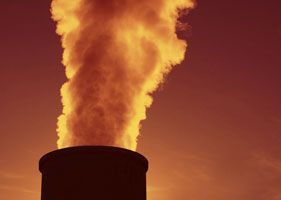Experts debate how to break the deadlock in global climate-change politics
Posted on behalf of: Sussex Climate Change Network; Centre for Global Political Economy.
Last updated: Monday, 5 March 2012

Power station chimney
Tony Blair’s former climate-change advisor is among a distinguished panel of speakers who will consider the future of global climate politics at a public event at Sussex this month.
‘What future for global climate politics?’ will be held in the Fulton A lecture theatre at 5pm on 14 March, during the UK’s Climate Week (12-18 March).
The debate is timely: 2012 is the UN’s designated Year of Sustainable Energy For All and the UN’s Rio +20 summit (the United Nations Conference on Sustainable Development), which will place climate change high on its agenda, takes place in Rio de Janiero in Brazil in June.
But as the industrialised nations continue to battle economic upheaval, the political will to tackle the growing threats of global warming and climate change is stalling.
Targets and timetables for action fall woefully short of what the science suggests is required to keep global warming below dangerous levels. Unprecedented levels of finance for climate mitigation and adaptation are required, but we face the worst financial crisis for half a century, so where will the money come from and how will it be distributed?
The role of carbon markets is in doubt amid low carbon prices and a series of corruption scandals. Political leadership is sorely lacking. So, where do we go from here?
Addressing these and other issues are panel members:
- Mark Kenber, former climate change advisor to Tony Blair and CEO of the Climate Group;
- Farhana Yamin, legal advisor to the small island states in the UN negotiations and climate-change portfolio manager for the Children’s Investment Fund;
- Peter Newell, University of Sussex Professor of International Relations and a leading expert on global climate politics;
- Smita Nakhooda, Senior Research Fellow at the Overseas Development Institute and formerly of the highly influential Washington-based think-tank the World Resources Institute.
A short report will be produced from the debate and circulated widely to decision-makers, outlining concrete ideas about how to break the current deadlock and advance progress on this most critical of issues.
The event is sponsored by the University’s Sussex Climate Change Network and Centre for Global Political Economy.

